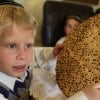This Shabbat we read from three separate Torah scrolls during morning services. The first is the weekly Torah portion, Tazria; the second is for Rosh Chodesh Nissan which falls on Shabbat; and the third is known as Hachodesh,1 which is appropriate for the upcoming Passover season. It is about establishing the Jewish calendar, the new month of Nissan, and how to observe Passover in Egypt, including the commandment to eat matzah.
Here’s an interesting question: Where is the very first mention of matzah in Scripture?
Surprisingly, not in Exodus but back in Genesis.2 Long before the Jews even dreamed of going to Egypt in the first place, we read the story of Lot, Abraham’s nephew, in Sodom. Lot took in and showed hospitality to the angels who had come to destroy Sodom’s wicked inhabitants and rescue him and his family. He may have been living in Sodom, a city notorious as the most inhospitable place on earth, but Lot had learned a tremendous amount from his uncle, especially when it came to hospitality, Abraham’s forte. So Lot endangered his own life by welcoming the celestial visitors in human disguise.
And what did he serve his guests? Unaware that they were in fact angels, Lot fed them a nice meal. And on the menu was matzah. Rashi, quoting the Midrash, says it was Passover at the time.3 Only centuries later, following the Exodus, would matzah become the staple of our Passover Seders.
This inspired a beautiful idea in the writings of the late Rabbi Yerachmiel Yaakov (E.J.) Duschinsky,4 head of Cape Town beth din and a graduate of the famous Pressburg Yeshivah.
Long before matzah became a symbol of our freedom, it was a symbol of hospitality, compassion, and sharing. There is the Matzah of Freedom and there is the Matzah of Hospitality. And showing hospitality and kindness to others must come first. It is a fundamental prelude to our own experience of freedom.
Before we can celebrate our own matzah of freedom and liberation on Seder night, before we can enjoy our holiday with family and friends, we must know that we have done our duty to those less fortunate.
Is freedom all about us, and breaking the shackles of oppression that physically enslave us? Or is it about being able to live free, positive, spiritually meaningful lives where we can be of service to humankind and the world?
In simple terms, is a democracy all about rights or responsibilities? There is a huge philosophical difference between the two.
Interestingly, the Torah hardly speaks about rights. Its focus is squarely on our responsibilities. Our eternally relevant Guide to Life well understood that if we act responsibly then everyone else’s rights will be naturally protected.
Indeed, freedom itself is a big responsibility. Only when we act responsibly and graciously to others will we be able to enjoy our own Matzah of Freedom. When we learn to respect and care for others, then we will be able to enjoy the fruits of our freedom with rights, health, education, housing, and please G‑d, peace and prosperity for all.
Passover is traditionally a time for giving and helping the less fortunate manage with the additional financial burdens that the holiday presents. Let us open our homes and be givers, and together with our guests we will tap into true spiritual freedom.









Start a Discussion